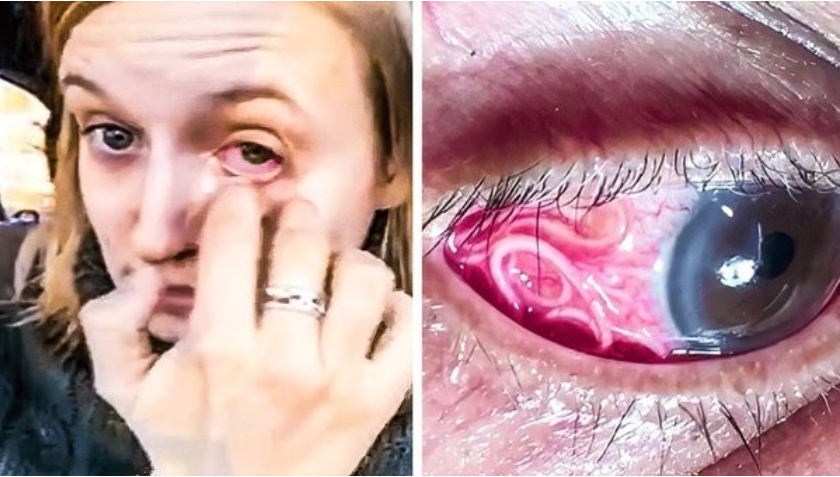Woman Mistakes ‘Eyelash’ for Something Far Worse! What Doctors Found Will Haunt Your Nightmares!”

Woman thinks eyelash is an eye, but doctor explains it’s a parasite. On a ranch in Brookings, Oregon, Abby Beckley grew up as an outgoing young woman. Being the outdoorsy girl that she was, she immediately seized the chance to work on a commercial salmon fishing boat in Craig, Alaska.

Everything seemed to be going well for young Beckley until a couple of weeks into her job, which was when she started facing symptoms. She experienced frequent migraines along with these symptoms, which included her left eye being red, irritated, and droopy. Beckley went through these symptoms for five whole days until she finally reached the port, which was when she took a good look at her left eye. She pulled the bottom of her eye down and noticed that the skin there looked odd. She then proceeded to sort of pluck her eye with her fingers, and lo and behold, out came a worm.
Doctors Discover Worms in Woman’s Eye, Send Samples to CDC for Examination
When Beckley’s family and friends learned of this, they urged her to go back home and see a doctor. She got an appointment at Oregon Health and Science University in Portland, where there were a bunch of doctors who took a look at her eye.
All the doctors were more or less doubtful of Beckley’s claims, as they, like many others, had never seen a case of someone with worms in their eye. But suddenly, to their shock, they saw one squiggle across Beckley’s eye. The doctors took several worms out of Beckley’s eye and sent them straight to the CDC for examination. Meanwhile, Beckley continued visiting the university regularly for vision tests, which went well.
Woman pulls multiple worms from her eye, doctors reassure they won’t go deeper than surface
But when it came to flushing out her eye for any worms that may have been hiding in there, things didn’t seem to be going too well. As Beckley, while at home, constantly pulled one worm after another from her eye, she was afraid of what the worms could potentially do to her, which she thought could have been facial paralysis, vision loss, or even brain infection.
But her doctors reassured her that the worms would not go deeper than the surface of her eye. “I was definitely in distress for sure, but I also started making jokes because I had to deal with it,” Beckley explained. “It’s so gross to think about, but it was happening to me,” she added. Meanwhile, scientists back at the CDC were expecting to find a parasite species called Californisis, which had about 10 cases to its name in the U..
Rare Eye Worm Found in Oregon Woman’s Eye
According to CDC’s Bradbury, Californisis is an eye worm which usually infects dogs and rarely humans, and that most of the cases of eye infections due to worms typically show up in rural areas among infants and the elderly. However, this is not always the case, as a 21-year-old South Korean soldier also got eyeworms from the Asian strain Calapedia after coming in contact with an infected dog in his father’s factory. Another type of eye worm called Calapedia found in Asia and Europe has also infected people, but it’s also rare, with only about 163 reported cases in the world, he explained.
The 21-year-old from Korea couldn’t recall anything wrong with the dog, according to reports. Similarly, Beckley also had no memory of being under circumstances under which her eye could have been infected by a worm. Bradbury then revealed that Beckley’s eye was infected by the worm species Thalassia gulosa, which has always been found in cattle but never in humans until Beckley came along.
New Species of Worm Found in Woman’s Eye After Fishing Trip Near Cattle
That is to say that Beckley probably got infected by the cattle near her house before she went on her fishing trip. “It’s possible that there are other cases that were misdiagnosed as another species of the worm because people just assume that it will be,” Bradbury said. “But through our work, we were able to understand that a brand new species can now infect people who are around cattle.
Beckley’s treatment was not what most people expected, which was for her to be given anti-parasitic medicine, as it wasn’t the best option. She was, in fact, told to simply keep removing worms from her eye until she was done with all of them. Almost three weeks after Beckley’s nightmare began, she finally found one last worm wiggling in her eye, which she pulled out straight away. It all ended with Beckley’s vision being unharmed and her not suffering any other complications.




